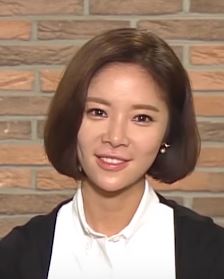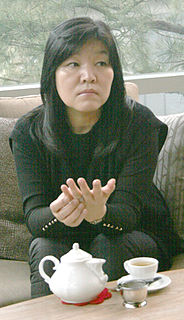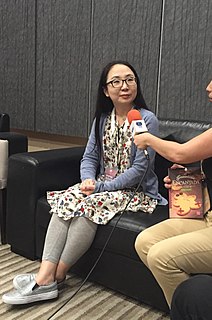This article presents lists of the literary events and publications in 2000.

Paju is a city in Gyeonggi Province, South Korea. Paju was made a city in 1997; it had previously been a county (gun).

Sejongno, also known as Sejong-daero, is a street that runs through Jongno-gu in downtown Seoul. It is named after King Sejong the Great of Joseon. The street is 600 meters in length, but due to its central location it is of great symbolic importance. It points north to Gwanaksan and Bukhansan (Mountains), and the Joseon Dynasty palace, Gyeongbokgung. It is also of historical significance as the location for royal administrative buildings and features statues of the Admiral Yi Sun-sin of Joseon Dynasty and King Sejong the Great of Joseon.
Hwang Jini or Hwang Jin-Yi, also known by her gisaeng name Myeongwol, was one of the most famous gisaeng of the Joseon Dynasty. She lived during the reign of King Jungjong. She was noted for her exceptional beauty, charming quick wit, extraordinary intellect, and her assertive and independent nature. She has become an almost myth-like figure in modern Korea, inspiring novels, operas, films, and television series.

Hwang Jung-eum is a South Korean actress and singer.

Han Kang is a South Korean writer. She won the Man Booker International Prize for fiction in 2016 for The Vegetarian, a novel which deals with a woman’s decision to stop eating meat and its devastating consequences. The novel is also one of the first of her books to be translated into English.

Kyung-sook Shin is a South Korean writer. She is the first South Korean and first woman to win the Man Asian Literary Prize in 2012 for Please Look After Mom.
Lee Seung-u is a South Korean writer.

Kim Insuk (Korean: 김인숙) is a South Korean writer.

Leafie, A Hen into the Wild, also called Daisy, A Hen into the Wild in English-speaking countries, is a 2011 South Korean animated drama film which depicts the freedom, will and instinctive motherly love of a hen as she raises an adopted duckling. The film made box office history by drawing over 2.2 million viewers, the largest audience for a home-grown animated film in South Korea. It also received widespread critical acclaim upon release.
Kim Eun-jung, also spelled Kim Eun-joong, is a South Korean children's writer.
Chi-young Kim is a Korean English literary translator who lives in the United States.

Yim Soon-rye is a South Korean film director and screenwriter. She is considered one of the few leading female auteurs of Korean New Wave cinema.
Yun I-hyeong is a South Korean writer.
The history of Korean animation, the manipulation of images to make them appear as moving, began with Japanese and American characters dominating the industry. The first sound animated character was created in 1936. The first feature-length animated character appeared in 1967. Dooly the Little Dinosaur revolutionized the character market in 1987. As animation characters specific to Korea appeared, the Korean character market continued to grow. Since then, Korean character franchises have even exported their characters to other countries.

Choi Young-mi is a poet and novelist from the Republic of Korea, widely known for her poetry collection called At Thirty, the Party is Over ” and is one of the defining figures who ignited the #MeToo movement in Korea.
Han Yujoo is a South Korean writer. Her novels portray not so much the fate of people embroiled in some kind of conflict as their psychological state when they contemplate a situation or idea. She focuses on recording spontaneous thoughts or flashbacks, rather than on describing something accurately or developing a dramatic arc. In this absence of a clear plot, the reading experience consists mostly of following the author’s thought process. This is why Han’s work can be considered an example of the French nouveau roman or antinovel.
Yoon Sung-hee is a South Korean writer. Some writers believe that the goal of human life can be found in history. Some writers believe that the meaning of life is in intense moments that leave life in chaos. However, Yoon looks at life from a different perspective. She would say that the meaning of life is in the moments. In other words, the true important purpose of life is in the feeling of the present, and the diverse emotions from it such as pain, sympathy, pity, and beauty. One literary critic has stated the characteristic of Yoon's fiction as following. "The reality depicted by Yoon Sung-hee in her stories draws readers in with its colorfulness of a sensual present. Readers do not draw the story to their own historical lives, but they choose to climb into the reality inside the story, and live along with the characters." It can be said that Yoon's literary aim is to create a reading experience that breathes with the rhythm of life, using fiction as the subject.

Gu Byeong-mo is a South Korean writer. She made her literary debut in 2009 when her novel Wizard Bakery won the 2nd Changbi Prize for Young Adult Fiction. Her 2015 short story collection Geugeosi namaneun anigireul received the Today's Writer Award and Hwang Sun-won New Writers' Award. She penned the novels Pigeumalion aideul, Agami, and Bangjuro oseyo as well as the short story collection Goineun aniyeotjiman. Gu's debut novel Wijeodeu Beikeori was translated into Spanish by Minjeong Jeong and Irma Zyanja Gil Yáñez. They received the 24th Daesan Literary Award in 2016 for their translation.
Kim Sa-ryang (1914–1950) was a Korean writer. He wrote in a variety of genres including novels, plays, reports, and reviews, in two languages, Korean and Japanese. His career as a writer first began in Japan after publishing a short story written in Japanese, and his Korean-written works were later published in Korea. For his short story "Bit soge ," written in Japanese, he became the first Korean to be nominated for the Akutagawa Prize. He went to China in 1945 to join the army fighting for Korea's liberation. After the country's independence, he mostly lived and wrote in North Korea and died in 1950 during the Korean War.










